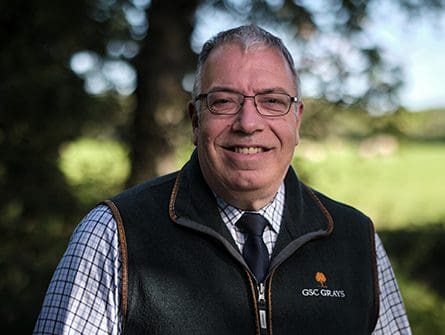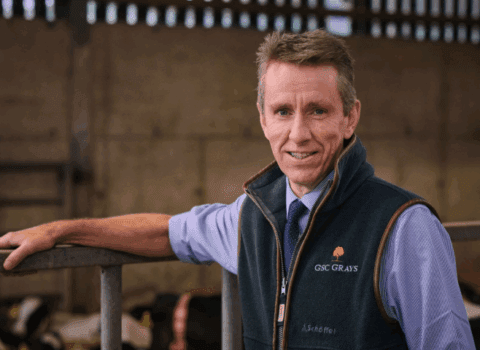Contact our offices
Main office
COLBURN
5 & 6 BAILEY COURT
COLBURN BUSINESS PARK
RICHMOND
NORTH YORKSHIRE
DL9 4QL
Estate Agency Offices are located in
BARNARD CASTLE, BOROUGHBRIDGE & RICHMOND
Residential Management Team
Our Offices
- Alnwick
01665 568310
Email Officealnwick@gscgrays.co.uk - Barnard Castle
01833 637000
Email Officebarnardcastle@gscgrays.co.uk - Boroughbridge
01423 590500
Email Officeboroughbridge@gscgrays.co.uk - Chester-Le-Street
0191 3039540
Email Officechester-le-street@gscgrays.co.uk - Colburn
01748 897630
Email Officecolburn@gscgrays.co.uk - Driffield
01377 337180
Email Officedriffield@gscgrays.co.uk - Hamsterley
01388 487000
Email Officehamsterley@gscgrays.co.uk - Hexham
01434 611565
Email Officehexham@gscgrays.co.uk - Kirkby Lonsdale
01524 880320
Email Officekirkbylonsdale@gscgrays.co.uk - Penrith
01768 597005
Email Officepenrith@gscgrays.co.uk

CHANGING PERCEPTIONS KEY TO TACKLING FARMING WORKFORCE SHORTAGES
Robert Sullivan, Head of Farm Business GSC Grays, believes changing perceptions about working in the farming industry will be key to tackling the drastic workforce shortages.
The workforce crisis saw a government review launched in August chaired by industry veteran John Shropshire, who is a farmer and former-CEO of horticultural firm Gs, and he is gathering data on labour shortages.
The government has already boosted the number of visas available through the seasonal workers route to 40,000, but Mr Sullivan has highlighted the need to fundamentally change the image of the industry to attract more labour and warns there is another significant problem looming.
He explained: “Labour is becoming more and more of an issue especially in the fruit and veg sector and intensive livestock, but all sectors of agriculture are affected to some degree. Labour is becoming a very scarce commodity, particularly of the quality needed to undertake the work that we’re asking people to do. There is a great deal of uncertainty as to where we are going to find replacements for existing farmers or farm workers who are going to retire in the next 5-10 years.
The main perception about farming is that it’s long, unsociable hours on a regular basis. However, as businesses get bigger, and require more labour, this actually provides more flexibility. Many larger businesses are now able to offer flexible working with so many days on, so many days off. This often leads to a better work life balance than was the case previously.
“People have always considered agriculture a low wage part of the sector but that actually isn’t the case now. Some of the top operators in this country are earning significant sums of money – £40,000 or £50,000 a year.
“The problem we’ve got is it’s very hard for an individual business to overcome this perception. That is probably something the agricultural community needs to address and improve at the more strategic level through the likes of the NFU and CLA to name two organisations.”
Mr Sullivan is also warning that the skills needed to operate expensive farm machinery is an area that also needs to be addressed before the current operators retire. He believes regenerative farming may be one solution and added: “Technology has moved on fantastically over the last couple of decades and we are now asking people to drive and operate machines that are worth hundreds of thousands of pounds. Therefore, they are highly technically competent operators and what we are seeing is the fact that whilst there’s a good number of these operators around at the moment, they are getting on in years like the rest of the farming community.
“One of the things about regenerative farming practices is the fact that because you are moving the soil less, you are requiring less machinery and hence require less people to sit on that machinery. If businesses are struggling for sufficient, quality labour, regenerative farming may well be a possible solution to the labour requirements of the business as well as the other benefits it provides in terms of improving the health of the soil.”
“There is no question in my mind that this issue, alongside inflationary pressure and subsidy changes, will fundamentally change the shape of farming in the long term. Farmers need professional advice and support to meet these challenges, and GSC Grays are able to offer free consultancy designed to tackle these issues through our FBAS scheme. We would urge farmers to take advantage of the advice, grant funded through Defra’s Future Farm Resilience Fund, to start making the changes now that will make their businesses fit for the future.”


GSC Grays News
GSC Grays launch innovative tool to unlock short-term funding for farm businesses
Read more







